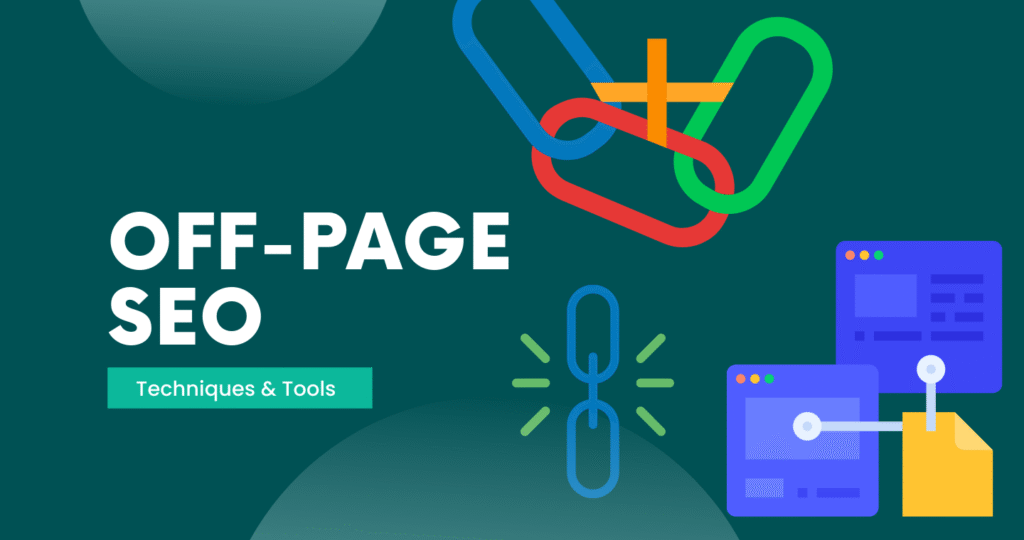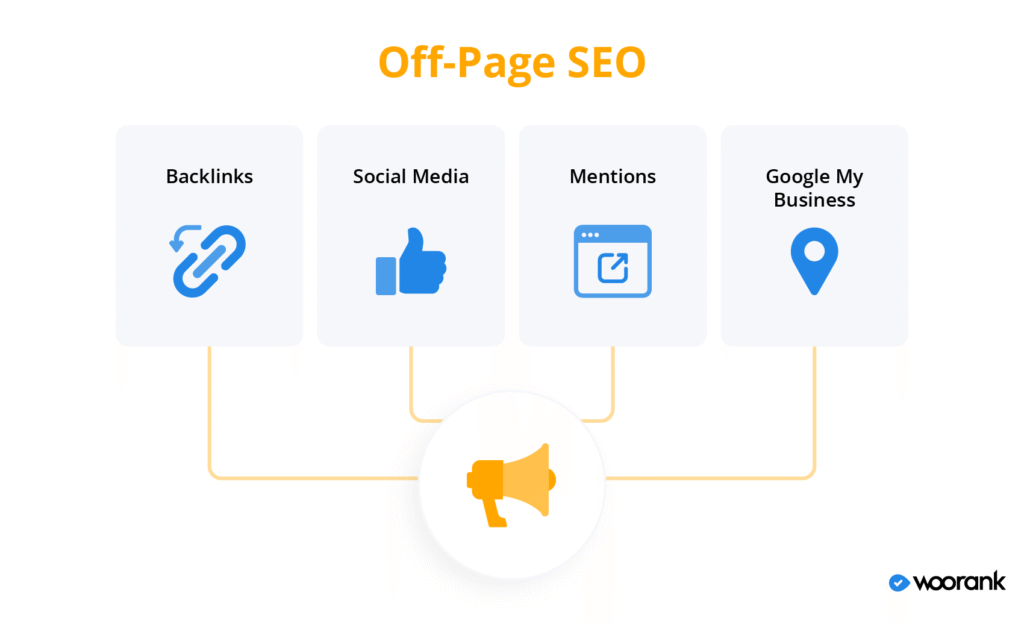Off page SEO refers to the actions taken outside of your website to improve its search engine rankings and online presence. Unlike on-page SEO, which focuses on optimizing content and website structure, off-page SEO involves activities that help build a website’s authority, trustworthiness, and relevance in the eyes of search engines like Google. The primary goal of off page SEO is to increase the number and quality of backlinks to your website, which are seen as votes of confidence from other authoritative sites.
Effective off-page SEO strategies include backlink building, social media marketing, guest posting, influencer outreach, and local SEO techniques. These actions contribute to better organic rankings, drive more traffic, and establish your site as an authority in your niche. In today’s competitive digital landscape, off page SEO is essential for achieving long-term success. By focusing on off page SEO, websites can improve their domain authority, boost credibility, and enhance their visibility in search results, ultimately attracting more potential customers.
Importance of Off Page SEO

Off page SEO plays a powerful role in improving your website’s visibility, authority, and ranking on search engines. While on-page SEO focuses on optimizing content and technical elements within your website, off page SEO focuses on everything that happens outside your site but still impacts your ranking.
✅ Boosts Search Engine Rankings: Search engines use external signals like backlinks, brand mentions, and domain authority to decide your page’s relevance and trust. Quality off page SEO helps you rank higher for competitive keywords.
✅ Builds Website Authority: The more reputable websites that link to your content, the more trustworthy your site appears to Google. This increases your domain authority, which is key for long-term SEO success.
✅ Drives Organic Traffic: Effective off page SEO brings referral traffic from blogs, forums, and social media platforms. These external sources act like highways bringing more people to your site.
✅ Strengthens Brand Image: When your website is mentioned by other trusted platforms, it creates a strong digital presence and builds your brand reputation.
✅ Enhances Online Visibility: Off page techniques like guest posting, influencer outreach, and social sharing help more people discover your content across different platforms.
✅ Encourages Faster Indexing: When search engines find links pointing to your website from other indexed pages, your new content gets crawled and indexed faster.
Key Components of Off Page SEO
Understanding the key components of off page SEO is crucial for improving your website’s authority, visibility, and ranking on search engines. These external signals work together to show Google that your content is trustworthy, valuable, and worth ranking higher.
✅ Backlink Building: Backlinks are the backbone of off page SEO. When authoritative websites link to your content, it signals trust and relevance to search engines. Focus on getting high-quality, niche-relevant backlinks rather than quantity.
✅ Social Media Engagement: Shares, likes, and comments on social platforms help expand your content’s reach. While social signals aren’t direct ranking factors, they support off page SEO by increasing visibility and driving traffic.
✅ Guest Posting: Writing valuable content for other websites in your niche helps build backlinks and position you as an expert. It also exposes your brand to new audiences, improving credibility.
✅ Influencer Outreach: Collaborating with influencers or thought leaders can lead to quality mentions, backlinks, and referral traffic. This boosts your brand’s trust and reach.
✅ Forum and Blog Commenting: Engaging in relevant forums or blog discussions with insightful comments and links (when appropriate) helps you connect with your audience and drive niche traffic.
✅ Local SEO and Citations: Adding your business to online directories and managing Google My Business helps improve local visibility—an essential off page SEO strategy for location-based businesses.
Backlinks in Off Page SEO

Backlinks are one of the most important elements of off page SEO. A backlink is simply a link from another website pointing to your own. The quality and quantity of backlinks play a crucial role in determining your website’s authority, trustworthiness, and overall ranking on search engines.
✅ Improves Search Engine Rankings: Google sees backlinks as votes of confidence. When reputable websites link to your content, it signals to search engines that your content is valuable and trustworthy. This helps improve your website’s position in search results.
✅ Builds Domain Authority: Domain authority (DA) is a measure of your website’s credibility. The more high-quality backlinks you have, the higher your DA will be. Backlinks from authoritative websites in your niche can significantly increase your website’s authority.
✅ Drives Referral Traffic: Backlinks don’t just help with SEO; they can also drive direct traffic to your website. When users click on links from trusted sources, they are more likely to engage with your content and become long-term visitors.
✅ Enhances Credibility and Trust: A link from a trusted website helps build your reputation and trustworthiness. It shows both search engines and users that your site is a valuable resource within your industry.
✅ Diversity of Backlink Sources: Having a diverse set of backlinks from different types of websites (e.g., blogs, forums, social media) creates a natural link profile and strengthens your off page SEO efforts.
White Hat vs Black Hat Off Page SEO
When it comes to off page SEO, there are two main approaches: white hat SEO and black hat SEO. Both aim to improve your website’s rankings, but the strategies and results are very different.
✅ White Hat Off Page SEO: White hat off page SEO uses ethical, Google-approved techniques to build authority and trust. These methods focus on long-term growth and include:
- Earning high-quality backlinks naturally
- Guest posting on relevant and reputable websites
- Promoting content through social media and influencers
- Participating in genuine online communities and forums
- Creating shareable, valuable content
❌ Black Hat Off Page SEO: Black hat off page SEO involves manipulative tactics that violate search engine guidelines. These may offer quick wins but come with serious risks, including:
- Buying low-quality or spammy backlinks
- Using automated link-building tools
- Posting in link farms and spammy directories
- Keyword stuffing in anchor texts
- Fake social signals or reviews
Tools to Monitor Off Page SEO
Monitoring your off page SEO efforts is just as important as doing them. Without the right tools, it’s difficult to know whether your strategies are working. Thankfully, several powerful SEO tools help track your backlinks, domain authority, brand mentions, and more — making it easier to measure the success of your off page SEO.
✅ Ahrefs: Ahrefs is one of the most popular SEO tools for tracking backlinks. It shows you how many sites are linking to your pages, the quality of those links, and which content is earning the most links.
✅ SEMrush: SEMrush offers detailed backlink audits, referring domains analysis, and toxic score checks. It helps you maintain a clean and strong backlink profile for better off page SEO performance.
✅ Moz Link Explorer: Moz provides domain authority scores, backlink analysis, and spam score detection. It’s perfect for understanding the strength of your link-building efforts.
✅ Google Search Console: Though not a full SEO tool, GSC shows who is linking to your site and what anchor text they use. It’s free and reliable for basic link tracking.
✅ BuzzSumo: BuzzSumo tracks social shares, influencer mentions, and trending content. It’s great for monitoring the social side of off page SEO.
Common Mistakes in Off Page SEO
While off page SEO is essential for improving search rankings and online visibility, many website owners make critical mistakes that can hurt their SEO performance instead of helping it. Understanding these common errors can save you from penalties and ensure long-term growth.
✅ Buying Low-Quality Backlinks: One of the biggest mistakes in off page SEO is purchasing backlinks from spammy or irrelevant websites. These links may seem like a quick win, but search engines often detect them and can penalize your site.
✅ Overusing Anchor Texts: Using the same anchor text repeatedly across multiple backlinks can appear manipulative to Google. A natural and diverse anchor text profile is crucial for a healthy backlink strategy.
✅ Ignoring Relevance and Authority: Getting links from unrelated or low-authority sites weakens your SEO. Always aim for backlinks from trusted and relevant domains in your niche.
✅ Focusing Only on Backlinks: Off page SEO is not just about link-building. Ignoring other strategies like brand mentions, social media presence, and influencer outreach can limit your success.
✅ Lack of Consistency: SEO is a continuous process. Inconsistent efforts in your off page SEO campaign—such as posting one guest blog and stopping—can slow your progress.
✅ Comment Spamming: Leaving random comments with backlinks on blogs or forums is outdated and considered spam. It adds no value and can harm your reputation.
Best Practices for Effective Off Page SEO
To get the best results from your off page SEO efforts, it’s important to follow proven and ethical strategies. These practices help build authority, drive organic traffic, and improve search rankings in a long-term and sustainable way.
✅ Build High-Quality Backlinks: Not all backlinks are equal. Focus on earning links from authoritative, relevant websites within your niche. Avoid spammy or paid links—they can harm your rankings.
✅ Create Shareable Content: Valuable content naturally earns links and shares. Blog posts, infographics, videos, and research reports can attract attention from bloggers, journalists, and influencers.
✅ Leverage Social Media Platforms: Engage actively on platforms like Facebook, LinkedIn, X (Twitter), and Instagram. While social shares may not directly impact SEO, they increase content reach and brand awareness.
✅ Guest Post on Relevant Sites: Write helpful and original guest posts for high-authority blogs in your industry. It boosts visibility and earns quality backlinks.
✅ Engage in Online Communities: Participate in forums, Q&A sites like Quora, and niche communities. Add value by answering questions and linking to helpful resources on your site.
✅ Use Local SEO Strategies: For local businesses, claim and optimize your Google My Business profile, build citations, and get local reviews to improve visibility.
✅ Monitor and Disavow Bad Links: Use tools like Google Search Console to track your backlink profile. Disavow toxic links to maintain your site’s health.
How Off Page SEO Impacts Google Rankings
Off page SEO is a crucial factor in how Google ranks websites. While on-page SEO focuses on optimizing content and technical aspects within the website, off page SEO influences rankings by building your site’s authority and trustworthiness across the web.
✅ Backlinks as Ranking Signals: Backlinks are one of the most powerful off-page SEO factors. Google sees backlinks from reputable sites as votes of confidence. The more quality backlinks your website earns, the more likely it is to rank higher. However, it’s not just about quantity—quality matters most. Backlinks from authoritative and relevant websites can significantly boost your rankings.
✅ Building Domain Authority: Domain authority (DA) is a metric that predicts how well a website will rank on search engines. A strong off-page SEO strategy helps increase your domain authority through quality backlinks, mentions, and consistent social signals, leading to higher Google rankings.
✅ Social Signals and Brand Mentions: Google uses social signals (likes, shares, and comments) and brand mentions across platforms as indicators of a website’s popularity and relevance. Active social engagement and brand mentions can indirectly improve your Google ranking by showing your content is valuable to users.
✅ Improved Trust and Credibility: When your website is linked to trusted sources and mentioned positively online, it signals to Google that your site is credible and authoritative. This trust factor boosts your chances of ranking higher for competitive keywords.
Conclusion
In conclusion, off page SEO is a crucial aspect of any successful digital marketing strategy. While on-page SEO helps optimize your website’s content, off-page strategies like backlink building, social media engagement, and influencer outreach help build your site’s authority, trust, and online reputation.
By investing time in off page SEO, you not only improve your search engine rankings but also increase organic traffic and brand visibility. High-quality backlinks from reputable websites signal to search engines that your content is valuable and trustworthy. As a result, your website is more likely to rank higher for relevant search queries.
Moreover, off page SEO techniques like social signals and guest blogging create valuable connections, boosting your website’s presence across various platforms. This drives more traffic, increases exposure, and establishes your brand as an authority in your niche.
Ultimately, a well-rounded SEO strategy that combines both on-page and off page SEO elements is key to achieving long-term success. Embrace these techniques, and watch your website grow in rankings, visibility, and credibility.
FAQs
What is Off Page SEO?
Off page SEO refers to all the activities you perform outside your website to improve its rankings on search engines. This includes building backlinks, social media marketing, influencer outreach, and more. It helps establish your website’s authority and trustworthiness.
Why is Off Page SEO important?
Off page SEO is essential because it enhances your website’s visibility, builds domain authority, and drives organic traffic. It helps search engines trust your site, improving its chances of ranking higher for relevant keywords.
How does Backlink Building help Off Page SEO?
Backlinks are one of the most important aspects of off page SEO. Quality backlinks from reputable websites signal trust and relevance to search engines, boosting your site’s authority and improving its search engine ranking.
What are Social Signals in Off Page SEO?
Social signals refer to mentions, shares, likes, and interactions with your content on social media platforms. These signals indirectly influence off page SEO by driving traffic, increasing visibility, and building brand awareness.
Can Social Media Marketing Help with Off Page SEO?
Yes! Social media marketing helps by driving traffic to your website, generating engagement, and building brand recognition. Although social signals are not a direct ranking factor, they support off page SEO efforts by increasing visibility and fostering brand authority.

